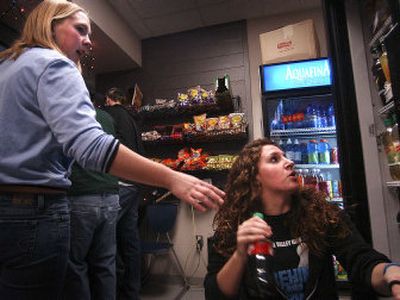New rules put pinch on snack food sales

Soy bars are not selling as well as Laffy Taffy candy. Baked chips and diet sodas haven’t flown off the shelves like Mountain Dew and Doritos.
With new nutrition plans this year preventing the sale of some soda and sugary, fatty snacks during the school day, Spokane Valley student clubs such as DECA are bracing for a sales pinch.
In Spokane Public Schools, DECA store sales have dipped 35 percent to 60 percent.
Unlike Spokane’s policy, which cut unhealthy snacks out of the schools cold turkey, Central Valley School District has taken a slower approach.
The CV School Board adopted a nutrition policy this past summer phasing out unhealthy foods over the next five years. Under the guidelines, CV schools must offer a 50/50 mix of healthful foods and junk food. Next year, it will be 60/40, then 70/30 and so on until all unhealthy snacks are gone.
At both Central Valley high schools, business and marketing programs known as DECA have reported only a slight decrease in revenue.
“Once we get to a point where pop is gone entirely, I think we’ll start to see a significant drop,” said Robin Barnhart, DECA adviser at Central Valley High School.
The nutrition guidelines are part of the recent reauthorization of the federal National School Lunch Program, which requires school districts to create wellness policies for nutrition and fitness to help in the battle against obesity.
According to the Centers for Disease Control and Prevention, 16 percent of children ages 6 to 19 are overweight. In Washington, 58 percent of adults are obese and 21 percent of high school students are overweight.
In reaction to the federal mandate, the state required districts to have a nutrition plan in place by Aug. 1.
Central Valley School District convened a committee of citizens, teachers, parents and school administrators to review its policy.
“We tried to think of everybody who might be affected by the policy and made sure they had a voice at the table,” said Jerry Thomas, student services coordinator for CV.
The committee came up with the five-year plan that affects all levels of food service, including what is sold in the cafeterias.
District staff created worksheets to deal with scenarios such as bake sales, which no longer are allowed during school hours, and birthday parties, for which teachers and parents are encouraged to consider more healthful options.
But, as in most districts, the groups likely to be most-affected are DECA stores and the Associated Student Body, which traditionally have received funding from competitive foods within schools and in vending machines.
“Initially, there was a lot of anxiety because they were concerned about revenue strain,” Thomas said. “But I think for us, the anxiety was greater than the reality.”
That was not the case for Spokane schools.
Spokane County’s largest school district has seen dips in DECA store sales of up to 60 percent. DECA uses store sales to help subsidize costs associated with state and national competitions.
“I really feel for them,” CV’s Barnhart said. “If they can’t afford to pay for the trip, they may lose the ability to get scholarships.”
Some DECA funds also go into the Associated Student Body general fund, helping keep costs down for things such as activities cards.
For both Spokane and CV students, the new policies have been a good lesson in how a government regulation can trickle down in the real world. Big vendors haven’t come up with more healthful options, and healthful food from small vendors is expensive.
“It’s been challenging to find healthier choices that fit the rules,” said Samantha Johnson, a University High School senior who manages the school’s DECA store. “We can only do what we can do.”
The complaining comes mostly from consumers.
“Kids don’t know about the (federal government’s) rules. They just get annoyed with us and think we are forcing healthy food on them,” said Brian Williams, a senior at CV. “When candy and chips are wiped out, that’s going to be rough.”
Spokane DECA stores, like the one at Ferris High School, have dabbled in items such as sausage breakfast muffins in an effort to raise sales. But the muffins ended up unsold and moldy and were thrown out.
Shadle Park High School tried offering samples of more healthful items, but that became expensive very quickly, said Erin Ruehl, DECA adviser.
Both Central Valley and U-High did the same, offering free samples of Pirate’s Booty, a healthful rice snack.
“We’ve spent a lot of money doing that,” said Ryan Skay, a senior and president of CV’s DECA program. “People aren’t buying the healthy stuff. If they have the choice between picking what they know they will like and the new healthy product, they’ll go with what they know.”
The only change students seem to be accepting is the variety of more healthful alternatives to soda, such as Gatorade and flavored water. Mountain Dew, however, is still a top seller at both CV district high schools.
The new policy “actually gave us some motivation to find a broader line of things to sell,” said Cole Warmoth, a Ferris senior and DECA store manager. Clif Bars, baked chips, juices and diet soda have been the main items.
The club also toyed with buying broken computers to repair and sell. The idea was, well, broken.
“We found out none of us knew how to fix computers,” Warmoth said.
Central Valley DECA students considered selling batteries.
“We sold pencils and paper once, but that didn’t work,” Barnhart said.
Unless they can find a magic product that sells as well as Snickers and Mountain Dew, the student clubs are bracing for tight futures.
“I’m hoping the kids will get used to what we’ve got,” said Rob Peters, U-High DECA teacher. “Or they will just go out and get Mountain Dew or chips somewhere else.”